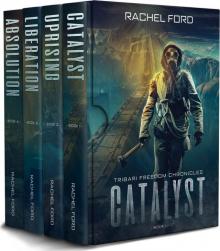- Home
- Rachel Ford
The Tribari Freedom Chronicles Boxset Page 9
The Tribari Freedom Chronicles Boxset Read online
Page 9
He glanced at his hour keeper. There were still five minutes until thirteenth bell. “We’ll start on the hour,” he decided. “Anyone who shows up after can follow.”
He didn’t want to give anyone a reason to call in the protectors, and a crowd of idle persons would be as good an excuse as any.
The minutes ticked by slowly. Grel passed along words of encouragement here and there, congratulating someone on a clever sign or remarking that another looked remarkably well. “That leg must be healing, Drew?” and “Nicely done, Di.”
The signs were good, too. They were exactly the kind of messaging they’d talked about in the past: short, simple, and to the point. He saw placards that read “Fair Wages” and “Safe working conditions” and “Clean Water is a Basic Tribari Right.” He saw calls for “Medical care for all” and “Close the prison colonies.”
One of the Keldan daughters – Grae, he thought her name was – carried a placard in her father’s memory: “Justice for the Carter’s Guild massacre victims.”
Deb had even brought a sign that read, “If life is so precious, let’s act like it: healthcare for all.”
They were going to make waves, that was for sure, he thought with a grin to himself. He checked his hour keeper again. It was time.
So, switching on his bullhorn, he turned back to his friends and raised a fist above his head. They matched the salute. Then, they marched.
Chapter Nine
Captain Elgin stepped out of his shuttle, onto the landing pad. He was at once surrounded by a swarm of armed men. He didn’t particularly fear a double cross from Nees. He’d reviewed her history, and whatever else she was, she didn’t strike him as a liar.
She’d served two tours into the Wastes. A radiation-filled sector on the far borders of explored space, the Wastes were a refuge for pirates, raiders and outlaws. It was a difficult assignment, and treacherous terrain. She’d served with distinction and been awarded for her valor. She’d run the volunteer fire department on Trapper’s Colony and served as the primary settlement’s emergency medic before a real doctor had landed. None of that spoke of someone whose word could not be trusted.
Of course, none of it would have indicated a terrorist in the making either. But it wasn’t Nees or any orders she might have given these men that concerned him at the moment. It was their nervous, unpracticed air as they pointed their weapons at him.
They were a ragtag group of civilians playing at being military personnel. He could see the fear in their eyes, in their steps. It didn’t get much more dangerous than putting a gun in a frightened, jumpy man’s hands and telling him to use it if necessary. Gods, I’m going to be so pissed if I go because some punk ass civvie jumps at his own shadow and puts a hole in my back.
Still, when he spoke, he spoke with an air of quiet, commanding calm. “Good morning, gentlemen. I believe your governor is expecting me.”
It seemed to have the desired effect. One of the gunmen lowered his weapon, saying, “You’re Captain Elgin?”
“So I’m told.”
“This way.”
He was marched toward a shuttle, but before he was allowed inside a burly man in a dark uniform stopped him. He passed a security wand over him, first across the front of his body and then the back.
“I did give my word,” he noted dryly when the scan turned up no weapons.
“Get in.”
“You’re not great conversationalists here,” he observed, stepping into the vehicle.
Again, his comments were ignored. The doors locked, and the shuttle kicked into motion. He glanced outside the tinted windows, at a landscape of red rock and brown earth. Now and again he’d catch sight of scraggly brown growths. But after a space, he saw a forest. It was mostly new growth with trees that seemed to have been planted in the last few cycles. There was, though, a solid backdrop of old trees. As they neared it, he realized it wasn’t a forest but an orchard, for the trees were fruit bearing.
They sped past, and farms began to dot the otherwise grim horizon. In the distance, the buildings of the settlement came into view. They passed into a middling sized city – sparse by the standards of any of the major planets, but this was the largest enclave on Trapper’s Colony.
After a few minutes, they rolled to a stop outside a large house. Like the city itself, it was unimpressive by comparison to anything on Central, but it stood large and imposing over the other habitations in the area.
He was ushered inside and through a set of hallways. It was like stepping into a museum with the walls plastered in commemorative photographs, except that the subject matter would have been far too trivial for most museums. There was a photo of a sapling with a plaque that read, “The first tree planted on Trapper’s Colony.” An infant’s photo, old and yellowed, hung by it, captioned, “Elias Yew, first child born on Trapper’s Colony.” Buildings and farms were remembered in similar fashion. Another time, he might have smiled at the quaintness of it all, at the kind of provincial pride small towns inevitably took in their objectively uninteresting histories.
Today, of course, was another matter. These provincial farmers had turned terrorist, and were threatening to destroy trillions of retkas worth of natural resources that belonged to Central.
“In here,” his escort said, gesturing to a room behind a door.
Elgin nodded and stepped past the other man. He opened the door with an outward show of ease and unconcern, but his muscles tensed as he stepped inside.
There were no surprises waiting beyond the door, though. There was only Governor Nees, seated behind a large wooden desk. She glanced up at him. “You’re late, Captain.”
There was a pleasure of victory in her tone, despite her apparent annoyance, that did not escape him. “You know how it is, trying to catch a shuttle at rush hour,” he shrugged.
She smiled, leaning back in her seat to survey him. She was, he knew, trying to get a read on him. He knew it because he was doing the same thing. Her body language told him she was completely at ease. He rather doubted it. Still, he was going to work the same tactic.
“You know,” he said with an easy grin, “I do believe you’re the first person I’ve met on this planet that appreciated a good joke. Your people don’t seem to have much sense of humor.”
“Oh Captain, I wouldn’t go that far.”
“How far?”
“To suggest it was a good joke.” She smiled. “Or that I appreciated it.” She gestured to the empty seat across from her. “Please, though, take a seat.”
“Just my luck,” he sighed as he lowered himself into the chair. “I would have to get taken hostage by terrorists without a sense of humor.”
Her smile broadened, but her eye twitched at the use of that word. Good. Whatever she’d become, at some point Nees had been a soldier, one of the good guys. She didn’t like to be reminded that she’d turned into one of the bad guys. As long as he timed it right, as long as he didn’t overuse it, that might prove an effective psychological weapon.
“You’re not a hostage, Captain.”
“Aren’t I?”
“Not at all. You’re free to go whenever you like.”
“You’ll simply blow up half the planet if I do?”
“Oh, nothing so drastic.” She shrugged. “You don’t need to destroy crude to make it unusable. And you know the funny thing about this planet?”
“What’s that?”
“It’s sat here producing oil for millions of years. But there’s a system of caverns just north of here. Have you ever heard of garbonite, Captain?”
“Of course.”
“When it encounters hydrogen molecules in a liquid state, it breaks them down. It actually builds more garbonite. Those caverns I mentioned? They used to be flooded. Now, they’re full of garbonite. We use it to speed the drying of grains during harvesting season.” She shrugged. “Once they’ve been rinsed, you don’t want to leave them wet too long or they’ll freeze. So you introduce the garbonite, and…” She spread her
hands in a quick, wide gesture. “It causes a chain reaction. The hydrogen breaks down, the water evaporates, the grain is dry. And you end up with more garbonite than you started with.
“Now…can you imagine what a few tons of that might do if introduced to the oil wells?”
He licked at his lips. They had gone very dry at the prospect. “I can’t imagine anyone who serves the Tribari people would want to find out,” he said.
“What Tribari people?” she asked, and her tone, now, was sharp.
“What?”
“Not my Tribari people. This oil has meant nothing but death and exploitation to the people of Trapper’s Colony.”
“If you have grievances,” he said, “you can bring them-”
“Grievances?” She frowned at him. “Are you a soldier, or a politician, Elgin? A man, or a mouse?”
He felt his ire rise, but he maintained a neutral tone. “I want a peaceful resolution to this. I think you do too, Governor.”
“Peaceful means different things to you and me. Peaceful, to you, means you don’t have to shoot anyone. You don’t have to risk harm to the oil fields. But your peace still leaves my people dead.”
“And your peace,” he countered, “leaves the empire weaker, poorer, less ready to respond to threats. The oil on this planet could fuel years of exploration and defense.”
“Defense?” she nearly spit out the word. “Who are you defending, Elgin? And against whom?”
“The nation. Against any and all threats.”
She shook her head. “You’re defending the Grand Contributors. You’re defending the Supreme Leader, and the extraction industry. You’re not defending the nation.”
“The nation needs that oil.”
“The nation doesn’t need to kill us to get it.”
“I’m not here to kill you,” he said, exasperated. “I told you that already.”
“No,” she said, “you’re not here to kill us. You’re just here to restore the leadership that was killing us.” She sneered at him. “Your hands are clean, though, yes? As long as you don’t have to pull the trigger, it stays ‘above your paygrade.’”
He sighed and stood. “I came to talk sense to you, Governor. Not to listen to diatribes. If you’ve nothing productive to say, I’ll take my leave.”
“Stop,” she called as he turned.
“You said I was free to go whenever I wanted,” he reminded her.
“You are,” she acknowledged, rising to her own feet. “But I’m asking you to stay, for a minute longer. To hear my terms. I didn’t call you here for ‘diatribes,’ Captain.”
“Your terms?” He laughed lightly. “Alright, Governor. Let’s hear these terms.”
“I’ll surrender.”
He nodded. “So far, so good.”
“But my people stay.”
“Those weren’t my orders.”
“I don’t give a damn about your orders. I’m the one who calls the shots here. Any issue Central has with what’s happened here is my responsibility, not theirs. And I’ll answer for it.”
“Anything else?”
She nodded, and he wasn’t surprised. “One other thing. You spend the rest of the day here. You come with me and see this colony – what Halford did to us, what your blockade is doing. And then, if it’s still ‘above your paygrade,’ I’ll go with you.”
“Nothing else?” he wondered. “No press corps to document for posterity the moment you throw yourself on your blade for the colony? They could hang the pictures in the hall alongside the shots of the first outhouse erected on Trapper’s.”
She smiled, a cool, disapproving smile. “Those are my terms, Captain. Accept them, or be on your way.”
Chapter Ten
Captain Elgin had accepted Governor Nees’s terms. Among a lot of lousy options, it seemed the least risky. Still, he wasn’t happy with it. He didn’t like negotiating with terrorists. He didn’t care for her sanctimony or her pretensions to serve some greater good. He didn’t like that her solution painted her into the role of self-sacrificing martyr. Martyrs were dangerous. They inspired stupid people to do stupid things.
Still, he had no better option. If she wasn’t bluffing about the garbonite, and he had a feeling that she wasn’t, she could destroy the entire wealth of oil on Trapper’s. And if that happened…well, Elgin would be better off throwing himself out the nearest airlock. It would mean a discharge from service for dereliction of duty. It would mean a prison sentence.
Trapper’s Colony was cold enough. He had no desire to be sentenced to the frigid wastes of the Zeta prison colonies. Even if the planet itself didn’t do him in, and it probably would, the other prisoners surely would. Cops and soldiers didn’t fare well in prisons, or so established wisdom had it anyway. He had no interest in finding out one way or the other.
So, he trudged dutifully along beside Governor Nees, and let her enjoy her moment of victory, her last exercise of power. Soon enough, they’d be onboard the Supernova. She’d be in the brig, and he’d be on the bridge. None of this would matter.
Right now, they were at the colony hospital. She’d dragged him along on a tour of it.
“This,” she was saying, “is the children’s wing of the hospital. We’ve had a five hundred percent increase in admittance since the blockade. Mostly due to nutrient and enzyme shortages, now that the dietary supplements aren’t coming in.”
He shook his head. “Tragic. Irresponsible leadership, to endanger so many children.”
She ignored the barb. She’d gotten rather adept at that, since they’d started this little jaunt through the settlement. “So far, we’ve been able to meet their needs here. But our emergency supplies are running low, too.”
“Good thing we’ll be wrapping up in a few hours, and this will all be over.”
“On the other hand, since I took over thirteen months ago, we’ve seen a two-thousand percent drop in adult admittance.”
He laughed. “That many people fleeing the planet?”
“That many people avoiding injury in the fields.”
“Trapper’s Colony oil production has fallen by twenty-five percent,” he reminded her. “That’s a huge loss of revenue and resource.” She stopped to stare at him, and the genuine mortification in her gaze rather shamed him. He shrugged nonchalantly, though. “Decreased productivity here impacts prices and lives all over the empire. Lower prices for fuel means cheaper transport, cheaper food, cheaper heating fuel.”
“How much cheaper?” she asked.
“What?”
“Well, for thirty months Halford cranked the extraction process beyond capacity. How much did your fuel go down back home, Captain? Can you even remember it going down?”
“Not off the top of my head,” he admitted, “but that’s just basic supply and demand.”
“Not when you control all the supply,” she said. “And even if it had, would it have been worth the men and women who died, who were maimed and mutilated?”
He sighed. “You know I don’t make those calls, right?”
“I know,” she said. “It’s above your paygrade.”
He frowned and said no more. She took him through the city, stopping now and again at sites of import. “This is where one of the rig drivers lost control of his vehicle,” she said as they drove past a monument. “There used to be a house there. The driver had been working eighteen hours for the last week. He fell asleep behind the wheel and plowed into the house. Everyone inside died: a mom and three kids. They sent him off to Zeta, and he died a few months later too.”
As they passed another home, she said, “Drake Calvir used to live there. Him and Lu. They were immigrants from Theta, from the mines. They were cleaning detail. Drake was in one of the vats when they started the pump. He drowned in crude. Security shot Lu two weeks later, when she confronted Halford. They said she was a threat; they didn’t have any other choice.”
He knew she was playing on his emotions, hitting him with hard luck story after hard luck
story to manipulate him to see things the way she wanted him to. He was no sucker.
Still, there was something about the sheer volume of stories she had that seemed…daunting. Sure, on a colony like this, there’d be problems. That was a given. But this many? The statistics had started to take on names, and in his imagination, faces. They were a little harder to accept with the same equanimity as they moved from mere numbers to names, to dates, to specific incidents; so many specific incidents.
They’d taken a backroad now, and were headed out of the main city. He glanced out the window. They were approaching the orchard he’d seen on his way into the settlement. “Let me guess,” he said, forcing a levity he didn’t quite feel, “someone fell out of an apple tree up here?”
She regarded him coolly, with a look that was more compassion than anger. It wasn’t the effect he was going for, and it irritated him.
“Come on,” he prodded. “There’s got to be some tragedy attached to the place. I’m going to be disappointed if you end our hard luck tour with a ‘and these are apple trees.’”
“It’s not the end,” she said.
“Oh, good. I’m having so much fun.”
“And they’re not apple trees. They’re katra fruit.”
“Whatever,” he shrugged.
The vehicle came to a stop, and she got out. He plodded along after her, allowing an audible sigh or two to escape his lips.
She walked along a path that took them among the trees. There were a lot of them, he saw – more than he had guessed from the road. They walked until they reached a kind of division, where to the rear the trees were aged and bowed under the weight of the fruit they bore. Nearer them, they were young, little more than saplings, and there were so many they seemed to reach into the horizon. “Do you know what this is?” she asked.
“An orchard?” He made sure that the hints of sarcasm in his tone were not too subtle.
“Of a kind, I suppose. But it’s Trapper’s cemetery.”

 An End in Ice
An End in Ice Squire Derel
Squire Derel Eye for an Eye (An Owen Day Thriller)
Eye for an Eye (An Owen Day Thriller) DLC: A LitRPG Adventure (Beta Tester Book 4)
DLC: A LitRPG Adventure (Beta Tester Book 4) Prison Break
Prison Break Dagger of Doom: A LitRPG Adventure (Beta Tester Book 5)
Dagger of Doom: A LitRPG Adventure (Beta Tester Book 5) Lee Shores
Lee Shores Viper's Nest
Viper's Nest Solar Flares & Tax Snares
Solar Flares & Tax Snares Without Sin (An Owen Day Thriller)
Without Sin (An Owen Day Thriller) UFOs & Unpaid Taxes
UFOs & Unpaid Taxes Bugs and Loopholes: A LitRPG Adventure (Beta Tester Book 3)
Bugs and Loopholes: A LitRPG Adventure (Beta Tester Book 3) Hero's Journey: A LitRPG Adventure (Beta Tester Book 2)
Hero's Journey: A LitRPG Adventure (Beta Tester Book 2) The Great MacGuffin: A LitRPG Adventure (Beta Tester Book 1)
The Great MacGuffin: A LitRPG Adventure (Beta Tester Book 1) MarvelousCon & Tax Cons
MarvelousCon & Tax Cons The Tribari Freedom Chronicles Boxset
The Tribari Freedom Chronicles Boxset Vengeance Is Mine (An Owen Day Thriller)
Vengeance Is Mine (An Owen Day Thriller) T-Rexes & Tax Law
T-Rexes & Tax Law The Time Travelling Taxman Series Box Set
The Time Travelling Taxman Series Box Set Mob Bosses & Tax Losses
Mob Bosses & Tax Losses